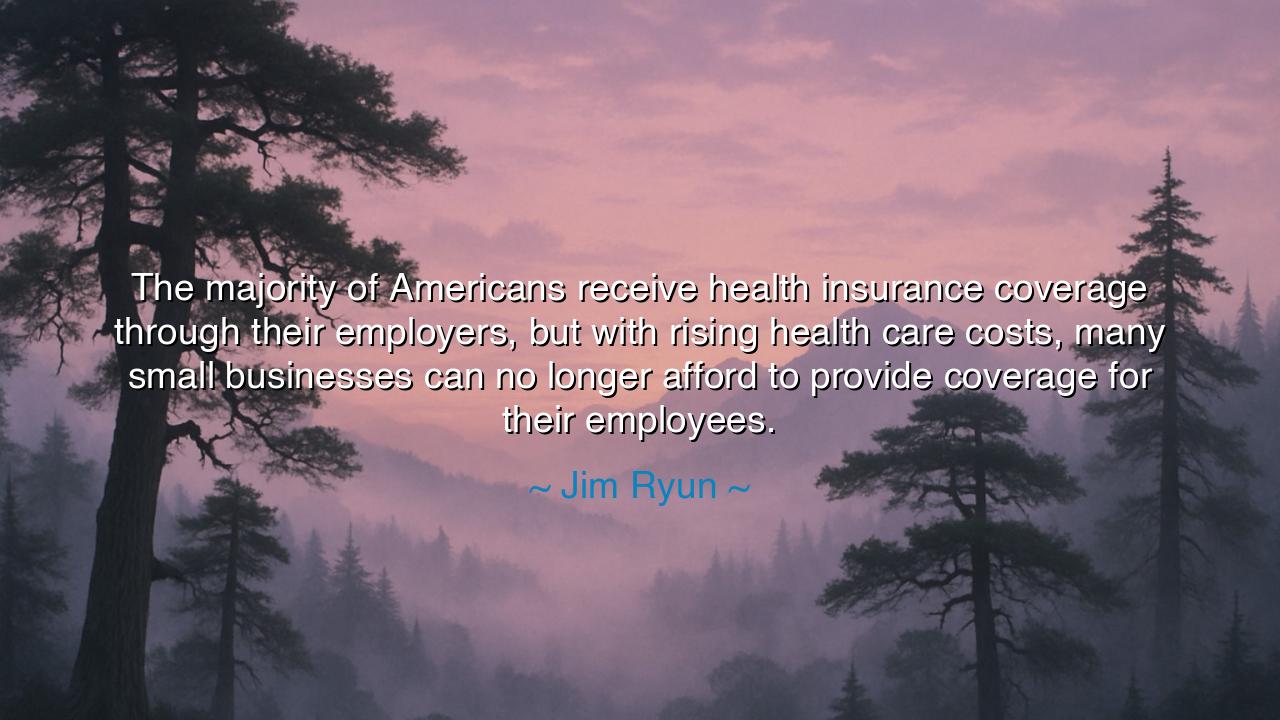
The majority of Americans receive health insurance coverage
The majority of Americans receive health insurance coverage through their employers, but with rising health care costs, many small businesses can no longer afford to provide coverage for their employees.






Hearken, O children of generations yet unborn, and attend to the words of Jim Ryun, who spoke with clarity and concern: “The majority of Americans receive health insurance coverage through their employers, but with rising health care costs, many small businesses can no longer afford to provide coverage for their employees.” In these words lies a reflection on responsibility, vulnerability, and the intricate balance between commerce and human well-being, a lesson as timeless as the struggles of societies to care for their members.
Consider first the importance of employer-provided health coverage. In modern times, as in ancient civilizations, the well-being of individuals often depends upon the structures that surround them. Just as city-states ensured the safety and nourishment of their citizens through communal provision, employment has become a conduit for access to care. Ryun’s observation reminds us that the bonds between work, sustenance, and health are both practical and moral, forming a foundation upon which society rests.
The phrase “rising health care costs” speaks to the universal challenge of scarcity and burden. In ages past, rulers and administrators faced similar dilemmas, determining how to distribute grain, water, and medicine in times of shortage. When costs rise beyond capacity, even the most virtuous systems strain, and those most vulnerable are forced to bear the weight. Ryun highlights the delicate tension between economic sustainability and human need, a tension that echoes through the annals of history.
Small businesses, Ryun notes, face the brunt of this burden. Like the artisans and merchants of antiquity, they labor not only to create wealth but to support their communities. Yet the rising costs of health care threaten their ability to fulfill this moral and economic obligation. The lesson is clear: when the means to care is strained, society must innovate, adapt, and provide structures that preserve both livelihood and life.
Consider the story of Florence Nightingale, who in the midst of war organized care for soldiers with limited resources. She demonstrated that innovation, foresight, and dedication could mitigate scarcity, preserving lives despite constraints. Similarly, today’s small businesses must navigate the rising tide of health care costs while striving to safeguard the welfare of those entrusted to their care. Ryun’s words remind us that commitment to human well-being must be preserved even under duress.
From this reflection emerges a lesson for all ages: society flourishes when its members are cared for, and falters when care becomes unaffordable or inaccessible. Health care, like education or safety, is not merely a commodity but a cornerstone of social stability and human dignity. When small businesses struggle to provide coverage, the ripple effects touch families, communities, and the broader fabric of society.
Practical action flows naturally from this wisdom. Advocate for policies that support sustainable health care access, encourage innovation in insurance and cost management, and foster community solutions that share burden equitably. Support small businesses in their efforts to care for employees, recognizing that the strength of a society is measured not only by its wealth, but by the well-being of those who labor within it.
Finally, remember the eternal truth: the health of a society is inseparable from the care of its people. Jim Ryun’s words are a clarion call: value human life, support those who provide for others, and seek systems that balance cost with compassion, for in doing so, the prosperity of commerce and the dignity of humanity may coexist, now and for generations yet to come.
If you wish, I can also craft a narration-ready version of this reflection, emphasizing the heroic, reflective cadence that makes Ryun’s insight vivid and memorable for oral storytelling.






AAdministratorAdministrator
Welcome, honored guests. Please leave a comment, we will respond soon